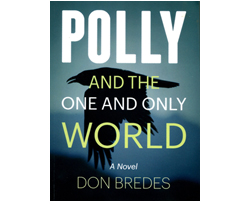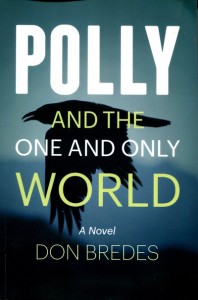
 copyright the Chronicle September 10, 2014
copyright the Chronicle September 10, 2014
Polly And The One And Only World, by Don Bredes. 335 pages. Paperback. Published by Green Writers Press. $14.95.
Reviewed by Tena Starr
Polly and the One and Only World is a page-turner.
I picked up the book on a Monday night, was a little late for work Tuesday morning because I desperately wanted to know what happened next, and finished it at two Wednesday morning.
You know that kind of book — the kind where you look at the clock and tell yourself you really should turn the lights off and go to sleep. Instead, you say, well, maybe just one more chapter, and keep saying it, until you’re at the end and know you’ll regret it in the morning.
Don Bredes, a Northeast Kingdom man, is an accomplished author. His first novel, Hard Feelings, was an American Library Association Best Book for Young Adults in 1977 and a 20th Century-Fox film release in 1982. Since then he’s written five other books, including this one.
Polly and the One and Only World is of the grim, but increasingly familiar, post apocalyptic genre in the world of both adult and young adult fiction. In some cases, the disaster that has struck the U.S. is nuclear.
The wildly popular Hunger Games series, where the U.S. has been reduced to a number of barely functional, and far from democratic, districts, doesn’t explain exactly what happened to get the country to such a grim and violent place. But nukes seem to be involved since District 13 has apparently been obliterated.
Increasingly, however, climate change is replacing nuclear war as the villain responsible for dystopia. Drought, coastal floods, major cities underwater, and ruined infrastructure have divided humans between those who have turned barbaric in the face of scarcity and those who have secreted themselves away in an effort to survive, while living an ethical life.
In the case of the gorgeously grim The Road, by Cormac McCarthy, the source of America’s disintegration is undefined, although nearly complete. A father and son trudge through a bleak and largely unpopulated country, in search of food where nothing grows, in search of human companionship where no one is to be trusted.
In Mr. Bredes’ novel, both nuclear war and climate change have apparently afflicted the country. New York is demolished and radioactive. The coasts are ravaged and dangerous. Large-scale agriculture is a thing of the past, as are gas-fueled vehicles.
Vermont survives, as it likely would in the face of climate change, but it’s altered, and it’s not safe. No place is safe in a country so desperate that the worst of human nature goes unchecked.
Mr. Bredes has added a couple of twists to his tale.
His America is ruled by fundamentalist Christians, a rigid and hateful people. If you want to live, basically you must accept Jesus Christ as your Lord and Savior. Deviation, or rebellion, warrant death at the hands of authorities who monitor nearly all human activity, implanting computer chips in citizens to keep track of them.
Unfortunately for his main character, she’s a witch, who practices majick. In Mr. Bredes’ future fundamentalist America, witches are burned alive. (Hmm. Remember this?)
Polly, a Vermonter, has been sent to Florida by her father, a mage, to stay with relatives. There, supposedly, she can blend and be safe. At least her father hopes so.
She can’t.
She is, in fact, on the verge of being taken into custody for heresy and sent to a “Rebirthing Camp,” or worse, when her “familiar,” a raven, appears and tells her to run.
A witch’s familiar is a bird or animal that makes a connection. There’s communication of a limited sort, and the familiar acts as guardian, as well as beloved friend.
Thus starts Polly’s adventure, which is not a pleasant one. She sets out to return to her father, a trek from Florida to Vermont, but on the way encounters the truly evil, the truly good, and the just plain tricky, who have abandoned ethics and independence in an attempt to survive in a cruel world.
On the way, she meets Leon, a good and resourceful boy, who becomes her companion. This is young adult fiction, so there’s obviously a love connection here, but it’s not graphic. Leon is interesting in his own right and turns out to have his own gifts.
I can say little more without giving away a riveting plot that sent me right back to the beginning of the book after I’d read it once.
Mr. Bredes has gone to great lengths here to create a book that is believable and readable. For instance, young Polly’s Wiccan spells are written in Old English by the poet Adrienne Raphel, and the “scavs’” vulgar language was translated into Spanish by dairyman Himar Escalante.
I’m an avid reader of young adult fiction, most likely because I have a young adult, but also because there are some wonderfully good books out there for adolescents and teenagers.
This is one of them.
J.K. Rowling did more than she likely knew. The Harry Potter books maybe woke up the publishing industry to the fact that young people will read if something compelling is available.
It also seems that when it comes to the realm of climate change, fiction is serving us most well. Few want to slog through scientific reports about probable disaster. Fiction writers have stepped into the gap and are telling us what our future may look like, and it’s bleak.
But there’s hope.
“What’s so wonderful about street lamps?” Leon asks Polly.
“They’re a lot rarer than stars, for one thing,” she says. “We created them. Nothing else in the universe can bend energy to its own purpose. Only us.”
If we can do that, we can do a lot more.
The book will be launched at the Brattleboro Literary Festival on October 4. Its on-sale date is October 6.
contact Tena Starr at [email protected]
For more free articles from the Chronicle like this one, see our Reviews pages. For all the Chronicle’s stories, pick up a print copy or subscribe, either for print or digital editions.







